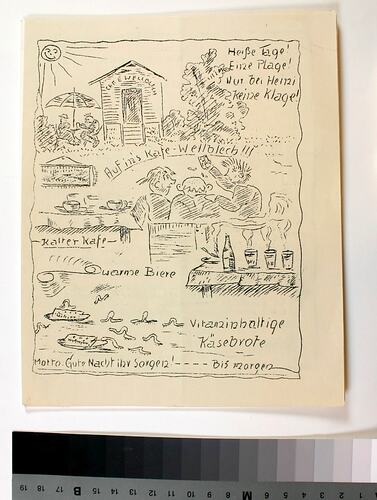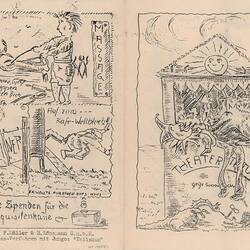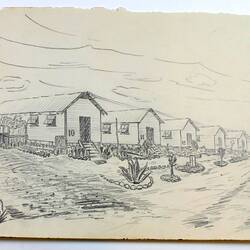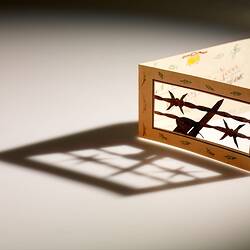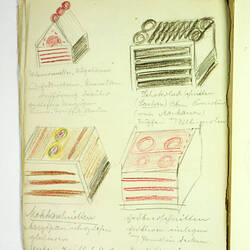Summary
This is a hand-drawn and photostat theatre program produced at Tatura Internment Camp in 1942. It features cartoon-style illustrations, and a list of performers and also includes an advertisement in German for Café Wellblech, for which Karl Muffler may have supplied cakes and pastries. The program demonstrates the kind of activities undertaken by interns (often instructed by other interns) to keep themselves occupied. Karl Muffler was interned as a German enemy alien at Tatura Internment Camp, from 1939 to 1944. He continued to bake and decorate cakes and other pastries for fellow interns during his internment and was awarded a special memento (a converted and inscribed penny] from his fellow internees in recognition of his confectionery services provided in Tatura.
This item relates to Karl Friedrich Muffler, qualified pastry chef and confectioner, born in 1900, who migrated to Melbourne from Germany in 1930, aboard the passenger liner 'Balranald'. Muffler quickly established himself in Melbourne, commencing employment with Bill Ikinger (who had recruited and sponsored him) at his cake shop in Brunswick, as well as joining the long-running German establishment 'Club Tivoli'. Muffler went on to establish his own business, 'The Embassy' in Malvern, and in 1939 married fellow German migrant Mathilde 'Hilde' Mayer. At this time they were members of the 'German Labour Front' of which Adolf Mayer (Hilde's father) was president. On 4th September, 1939 Karl Muffler, along with dozens of other German residents (including his father-in-law), was placed into police custody as an enemy alien. He was transferred to Tatura internment camp and while there undertook woodcarving and drafting classes and worked as a cake decorator. He was transferred to a Forestry Commission camp in Broadford, and finally released in 1945. With no family left in Germany he decided to stay in Australia and became naturalised in 1947. After the war, Muffler accepted a position at William Angliss Food Trades School in Melbourne teaching ex-servicemen new skills in cake decoration. He maintained a connection to the German community though Club Tivoli and died in 1996.
Description of Content
Camp program for Café Wellblech at Tatura Internment Camp.
Physical Description
Camp program, Photostat, A4 size, folded in half. Features cartoon-style illustrations on cover and inside a list of performers
Significance
This rich and diverse collection enables the exploration of a number of important historical themes, relating to migration as well as broader work and wartime narratives. Of key interest is the theme of working life and the proactive transporting of commercial and culinary traditions to Australia via the immigration process. Represented are the operational activities of pastry businesses around Melbourne in the 1930s, brought to life through tools and business records. The theme of internment and restriction of 'enemy aliens' during World War II can be explored through documents, mementoes, drawings, tokens and internment craft, and this collection is complemented by a large number of documents relating to Muffler held by the National Archives of Australia.The collection also provides a comprehensive overview of a migrant's experience: from garnering qualifications in country of origin to migrating; establishing a working life as practitioner and teacher; community connections and the subsequent consequences of those activities; the establishment of a domestic and social life, through marriage and ongoing cultural links; and the experiences of loss through separation through relocation, and loss of family due to war.
More Information
-
Collection Names
-
Collecting Areas
-
Acquisition Information
Donation from Ms Sue Muffler, 27 Apr 2005
-
Place & Date Used
-
Classification
-
Category
-
Discipline
-
Type of item
-
Overall Dimensions
169 mm (Width), 209 mm (Height)
-
Keywords
Cake Decorating, Entertainment, Forestry Camps, German Communities, German Immigration, Internment Camps, Pastry Making, World War II, 1939-1945
